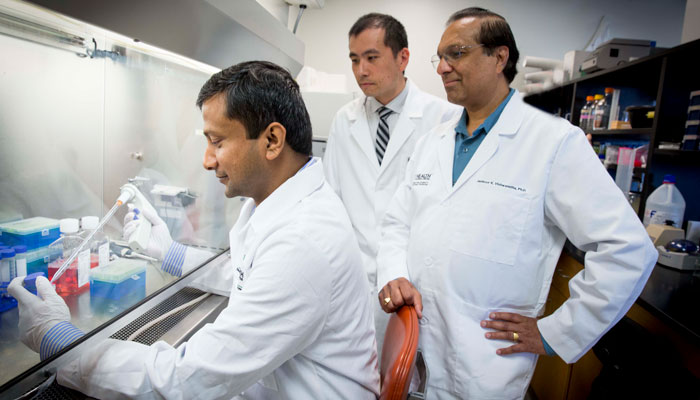A new look at triple-negative breast cancer
By Jan Jarvis
Triple-negative breast cancer (TNBC) is often aggressive, hard to treat and disproportionately affects carriers of the BRCA1 gene mutation and younger women of African origin.
Researchers at UNT Health Science Center have received a $1.9 million grant from the National Cancer Institute to help develop a new therapy that holds promise for the 38,000 to 55,000 women who are diagnosed with this disease each year.
Jamboor K Vishwanatha, PhD, and his colleagues – Pankaj Chaudhary, PhD, and Sumihiro Suzuki, PhD – will measure a protein called Annexin A2, which is shed from cancer cells and circulates in the blood. This protein leads to the aggressiveness of triple-negative breast cancer and its metastasis to other organs, said Dr.Vishwanatha, Regents Professor and Vice President for Diversity and International Programs.
“Our research could potentially lead to a biomarker that can predict aggressive TNBC metastasis in African-American women, and possibly lead to development of new therapeutic options for women with this type of breast cancer,” Dr. Vishwanatha said.
About 15 percent to 20 percent of breast cancers are triple-negative. This means that three common receptors known to fuel most breast cancer growth – estrogen, progesterone, and the HER-2/neu gene – are not present in the tumor. As a result, common treatments like hormone therapy and drugs that target estrogen, progesterone, and HER-2 are ineffective.
Triple-negative breast cancer is prevalent in women who carry a mutated copy of the BRCA1 gene and in women of African descent. Those who are diagnosed with TNBC have a high frequency of metastasis to the lung, liver and brain, and survival is generally poor.
African-American women with TNBC tend to have worse clinical outcomes compared with women of European descent who have the disease. The disease is often more aggressive in African-American women.
The research could lead to better treatments for those who are disproportionately affected by this disease, said Dr. Chaudhary, Research Assistant Professor in the Institute of Molecular Medicine.
“We predict the results arising from the proposed studies will lay the foundation for future studies to determine if circulating levels of Annexin A2 need to be taken into consideration during study design in metastasis detection, prognosis, and therapy for African-American patients with TNBC,” Dr. Chaudhary said.
Dr. Suzuki, Associate Professor and Chair of Biostatistics and Epidemiology in the School of Public Health, will oversee data management, data cleaning and preparation, and data analyses.
To conduct this project, Dr. Vishwanatha is working with collaborators from across the country and around the world, including 14 institutions in Africa and Europe.






Social media